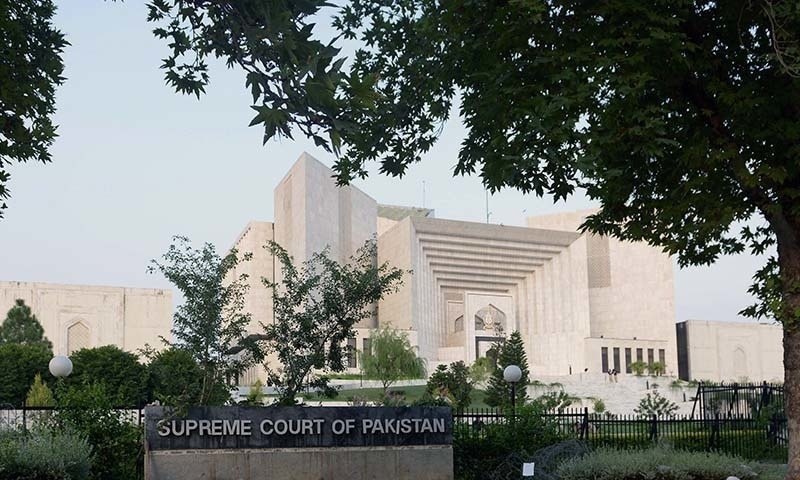ISLAMABAD: The Supreme Court on Thursday declined the federal government’s request to suspend the June 23 Sindh High Court (SHC) staying of the operation of the sugar inquiry commission report.
A two-judge Supreme Court bench consisting of Chief Justice Gulzar Ahmed and Justice Ijaz-ul-Ahsan had taken up the appeal moved through Additional Attorney General Tariq Mehmood Khokhar.
A number of sugar mills namely Mirpurkhas Sugar Mills Limited, Habib Sugar Mills Limited, Mehran Sugar Mills Limited, Shahmurad Sugar Mills Limited, Faran Sugar Mills Limited, Al-Abbas Sugar Mills Limited, Sindh Abadgar’s Sugar Mills Limited, Al Noor Sugar Mills Limited, Khairpur Sugar Mills Limited, Digri Sugar Mills Limited, Ranipur Sugar Mills Limited, SGM Sugar Mills Limited, Tharparkar Sugar Mills Limited, Sanghar Sugar Mills Limited, Dewan Sugar Mills Limited, Sakrand Sugar Mills Limited, Matiari Sugar Mills Limited, Bandhi Sugar Mills Limited and the Army Welfare Sugar Mills Limited had approached the SHC, which suspended the operation of the sugar commission report against these respondents.
During the hearing Attorney General for Pakistan Khalid Jawed Khan contended that normally an appeal to the Supreme Court does not originate from a stay order by the high court but this rule does not apply here as the SHC acted in an arbitrary and capricious manner by passing an order different from that of the Islamabad High Court (IHC), which had earlier validated the commission’s report.
Top govt lawyer says SHC acted arbitrarily by passing an order different from that of IHC
The AG highlighted that there was a regulatory capture of the Competition Commission of Pakistan (CCP), Federal Board of Revenue (FBR) and the Securities Exchange Commission of Pakistan (SECP) by powerful commercial interests. Therefore, the commission of inquiry had become necessary as none of the government departments and agencies were doing their job.
He contended that the commission’s report was merely in the nature of information and if anyone’s reputation had been affected by the report they had a remedy and they could come to court in its constitutional jurisdiction.
Senior counsel Makhdoom Ali Khan appearing for the sugar mills submitted that there was nothing unusual or exceptional in the order passed by the SHC, adding that it was quite common for a federal statute or federal executive action to be challenged before several high courts.
Each person approaches the high court of his province in such cases, he contended, adding that none of the petitioners before the IHC had gone to the SHC. As for the association it had not approached the IHC in a representative capacity but as a person which had a personal grievance, the counsel said.
Citing several judgements, Makhdoom Ali Khan submitted that associations could not in litigation act as representatives of their members.
During the hearing, Justice Ijazul Ahsan observed that the order of the IHC was not even considered by SHC.
The counsel however replied that the order was duly considered but it was not mentioned in the order of the SHC. He submitted that SHC was not obliged to mention it as it was an order of one judge which did not bind two judges and the order was not based on any reasons, had no persuasive value and was not based on any legal principle.
The counsel submitted that the lawyer for the federation could have appeared before SHC and argued their case for vacating the stay order or dismissing the petition. They did not.
Since they sought adjournment of the case there, they should not now be allowed to seek a suspension of the order before the Supreme Court, the counsel argued.
The counsel contended that citizens could argue about regulatory capture of the government, but it was not open to a government to plead that it had been captured and, therefore, can only operate through commissions.
He submitted that the right to reputation was no longer a mere civil right enforceable in tort litigation. It had constitutional protection. This was a right which in the last five decades had received increasing recognition from constitutional courts in common law countries, he argued. The counsel also cautioned against the danger of a narrow reading of the fundamental rights and such interpretations may come to haunt posterity and blight the legal landscape for generations.
The counsel contended that the mills were not heard by the commission.
During the hearing the chief justice inquired from the AG whether the notification for the appointment of the commission was published in the official Gazette. The AG, however, sought time to seek instructions. The court postponed further proceedings of the case for July 14.
Published in Dawn, July 3rd, 2020













































